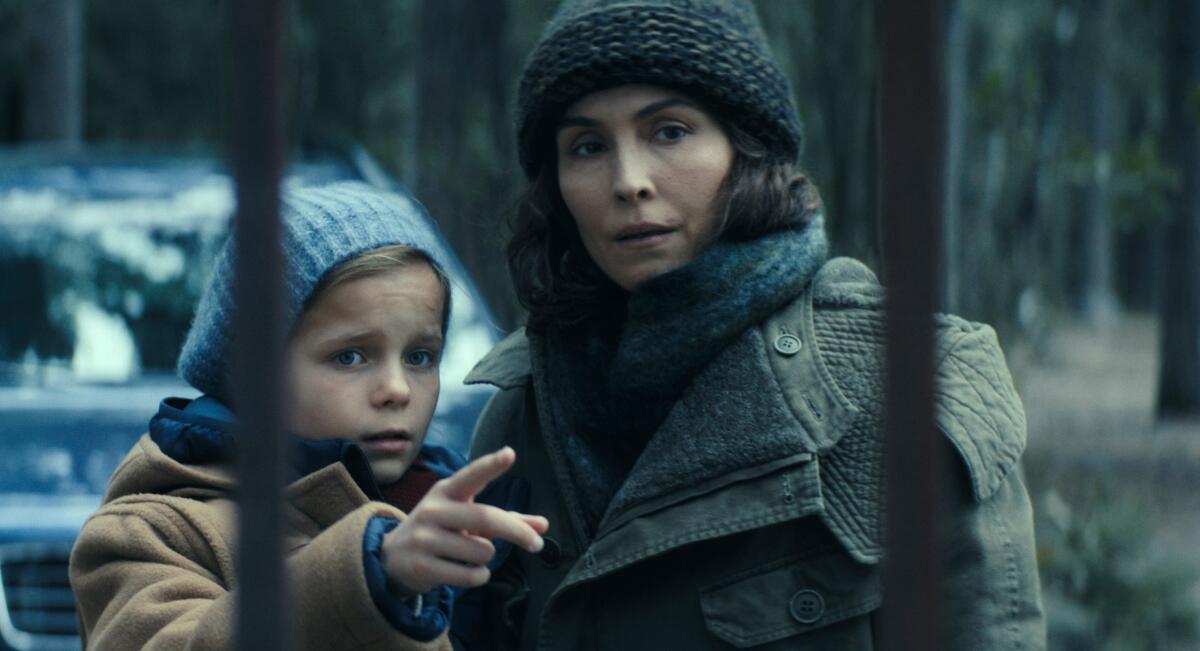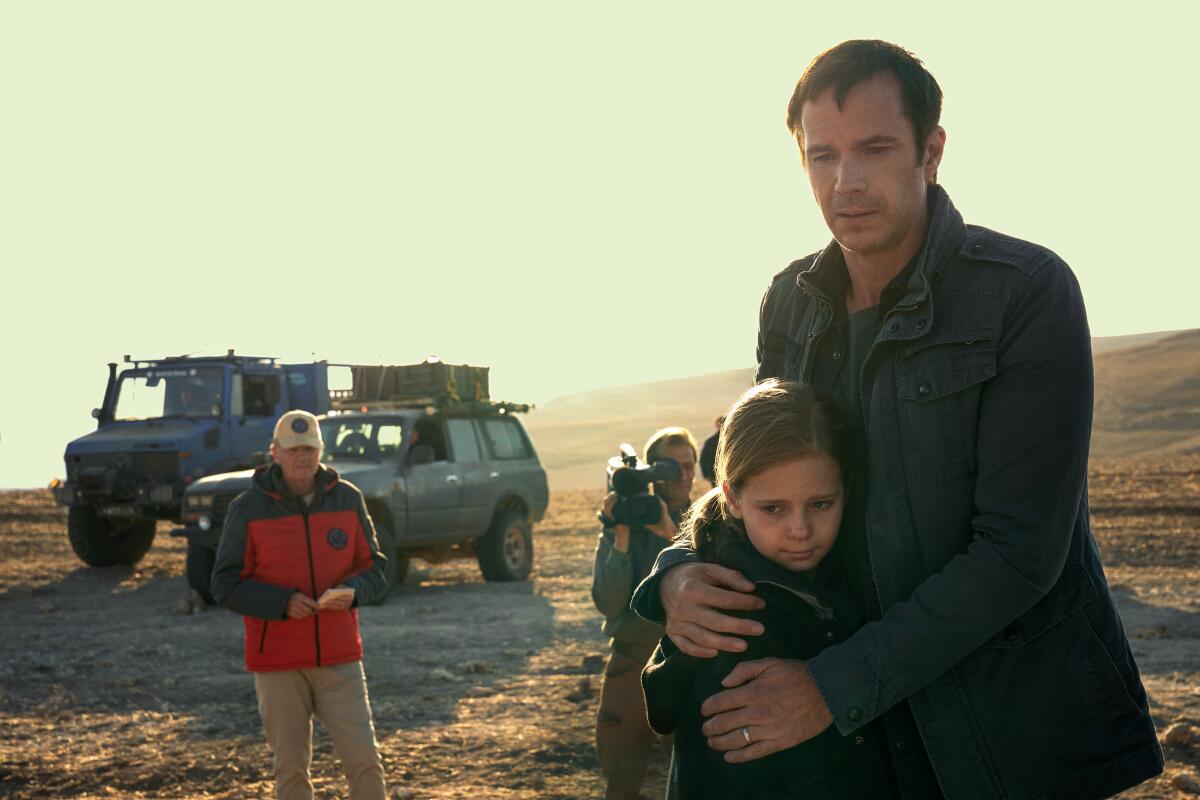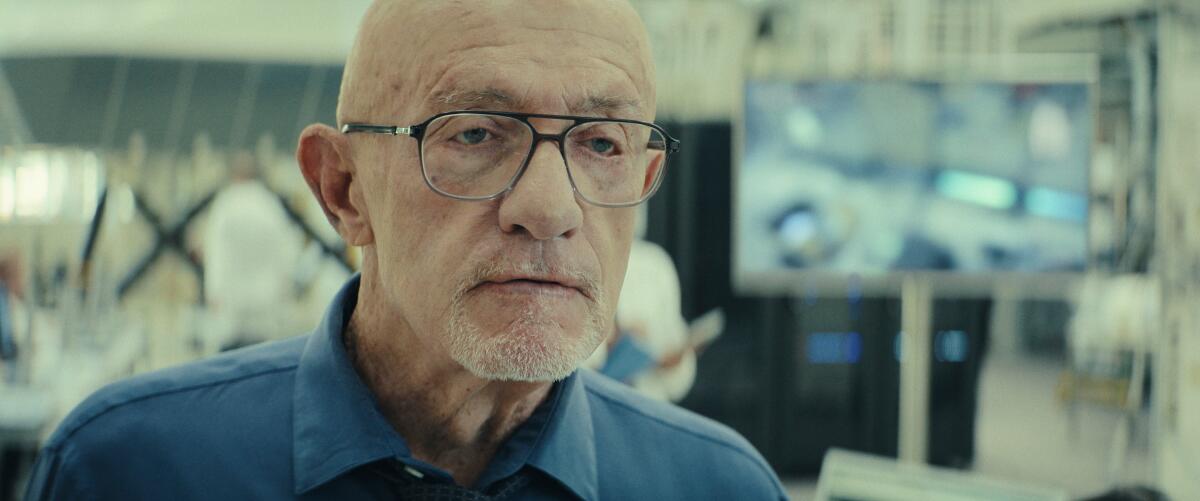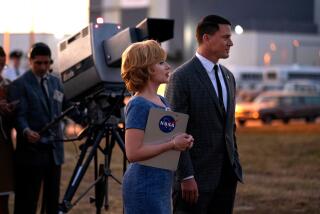Review: ‘Constellation’ is a tense, first-rate space thriller starring Noomi Rapace

Premiering Wednesday on Apple TV+, “Constellation” is a first-rate series about the bond between a mother and a daughter, couched in science fiction and set against outer space, suburban Cologne, Germany, and arctic snow.
Quantum mechanics have become much exploited by science fiction, for its poetry and practicality, but rarely so explicitly as here. Superposition and entangled particles, the observer effect and liminal space are discussed and enacted, metaphorically and otherwise; there is even a cat that is alive and dead. Indeed, it’s very much a life-and-death story, or more properly a life-and/or-death story.
Noomi Rapace plays Jo Ericsson, an astronaut serving on the International Space Station with four others; she is chatting by tablet with her 11-year-old daughter back on Earth, when something collides disastrously with the station, killing one crew member (William Catlett as Paul Lancaster). Sent on a space walk to assess damage, Jo dislodges what appears to be the desiccated body of a woman in the suit of Russian cosmonaut, circa late 1960s, which shoots from her grasp. Then, as life support systems begin to shut down, three of the remaining astronauts depart in an escape pod, filling it to capacity, while Jo races to repair a second pod to carry her home. This is all very suspenseful, exciting and convincingly handled, and it’s worth taking a moment to marvel at how far we have come both in special effects and what TV platforms are willing to pay for.

When Jo gets back to Earth, nothing seems quite right to her — not the hostility of her husband, Magnus (James D’Arcy), or the color of their car, or the fact that her daughter, Alice (Davina and Rosie Coleman), doesn’t speak Swedish. (The twin casting is dramatically meaningful as is the name Alice, an echo of Lewis Carroll’s heroine.) And somehow she knows how to play the piano. The viewer will sense right away that the problem lies not with Jo but with the world, however much the world regards Jo as out of joint. Her memories are dismissed as hallucinations, as symptoms of “high altitude psychosis” or “astronaut burnout,” and, without any real explanation, she is given both lithium and lithium disguised as vitamins. (Other characters, including Russian space chief Irene Lysenko, played by Barbara Sukowa, are taking pills as well.)
The first two episodes, of eight, are set largely in space and taken up with the accident, its aftermath and Jo’s white-knuckle return to Earth, where she will spend the rest of the series. Much is made of a glowing canister that Henry Caldera (Jonathan Banks), a Nobel Prize-winning scientist and former astronaut — and another pill-taker — is insistent be brought back to Earth. When we suddenly cut from land-locked business to a cruise ship in mid-ocean and a very different Caldera, we get a clue with what we might be dealing with here.
There are temporal dislocations, flashbacks and flashforwards and what might be called flashes-sideways, sometimes just for an instant, and it can be hard to keep track of the complicated architecture, or remember exactly what reality we’re facing at any one time. Still, if I was not always sure how, or if, some of the pieces stacked up, the dramatic intention was always clear, and what wasn’t obvious early on (mostly) became evident later on. For all of the science-fiction filigree, the thrust of the series is emotional — especially, though not entirely, as regards Jo and Alice, who don’t quite recognize each other, and the family drama that Magnus completes.

From the moment everything goes wrong in the space station, the series stays tense. There are elements of horror in the staging and editing — at least one shot that struck me as an homage to Stanley Kubrick — and psychological topsy-turviness. Things being not what they should be, and familiar persons seeming not themselves, are to be sure, old devices, and reliably terrifying.
Characters struggle to find one another through patterns of interference; whenever one you care about turns their back on another you care about, it’s never certain who’ll be there, or where they’ll be, when they turn back. The narrative is drawn out — just the scenes in space could occupy the whole of a feature film — and the pace is what many will think of as slow. I would call it deliberate, unhurried, and a smarter way to fill eight hours of television than plumping it up with extraneous plots and characters. It’s true that the storytelling does involve some repetition and circularity, and I imagine that some will find “Constellation” frustrating — you do have to go with its flow — but everything is to the point.
Created by U.K. playwright and screenwriter Peter Harness — that he wrote for both “Doctor Who” and “Wallander” feels appropriate — it’s a French-English-American co-production that, characteristic of European television, boasts a visual crispness, an absence of gloss and an air of reality even when the realism turns magic. (French co-production company Haut et Court was also behind the great undead series “Les Revenants.”) The mood — the moodiness — recalls the time-twisting German series “The Dark,” and the subject matter is in part reminiscent of “Counterpart,” the Berlin-set alternate worlds series, with J.K. Simmons in a double role.
Late developments suggest more to come — “Constellation” is not being advertised as a limited series — though I’d argue that nothing else is necessary. The series, or the season, comes to a conclusion that, if not necessarily expected, feels true. You can take that as a tribute to the series as it stands. Not every show, even every great show, needs to come back.
More to Read
The complete guide to home viewing
Get Screen Gab for everything about the TV shows and streaming movies everyone’s talking about.
You may occasionally receive promotional content from the Los Angeles Times.







